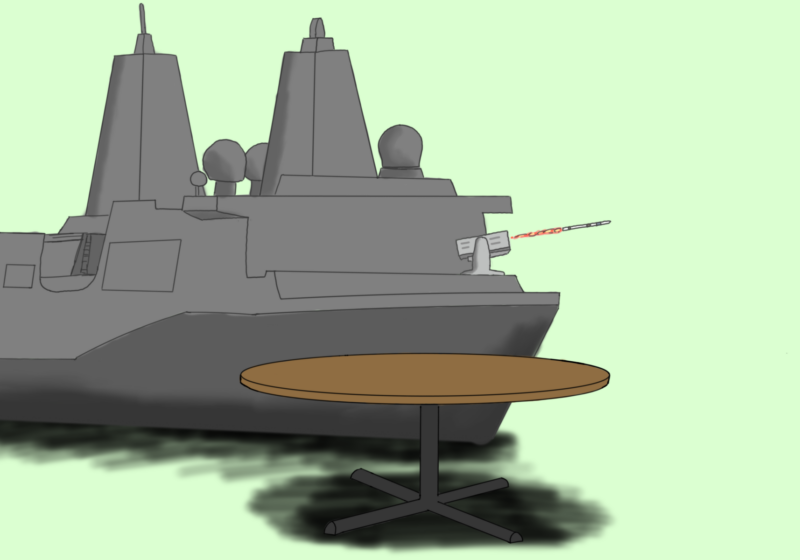I guess you could call Margaret Bond a take-59.
?I?m kind of the student that never left,? Bond said with a smile. ?I?m finally getting around to retiring.?
Bond, who was born in Rochester in 1925, began her education at UR in 1943 and has worked for the university ever since.
Bond wasn?t destined for press relations work. In fact, she admitted that when she graduated, she ?didn?t really know what she wanted to do.?
She began working for the Public Information Office on campus, moved to the Memorial Art Gallery and helped create a public relations office there. She then moved back to the Public Relations Office on the River Campus to take a position as University Editor in 1979.
In the position, she served as the editor of the Rochester Review, supervised the publication of Currents and helped with other special publications in the office.
Robert Kraus, the director of Public Relations for UR, heralded Bond as a truly selfless individual.
?Every magazine needs to find its editorial ?voice,? or it doesn?t work,? he said. ?She [has] basically established the magazine?s voice, with style and wit, and it?s provided a consistent package of commentary on University affairs ever since.?
For Bond, it has been all in a day?s work because of her love for editing anything she can.
?It is like a puzzle you?re putting together with a great many variables,? she said. ?And, ultimately, it is up to you what picture you?re putting together.?
Marcy Kraus, the director of UR?s Orientation Program, said she had the honor of working with Bond on redesigning the undergraduate admissions materials.
?She [had] an absolutely wonderful sense of just the right photograph from the archives, or just the right phrase about the academic experience here, that helped make these pieces distinctly Rochester? she said.
Vice President Emeritus and special assistant to President Thomas Jackson Roger Lathan thinks Bond is a UR ?legend.?
?She is a remarked person and a remarkable writer,? he said. ?She is truly dedicated to the University. She?s been such a fixture.?
Lathan, who came to UR 41 years ago, said he can?t remember anyone who has been with the university longer.
Bond has watched the school grow from being a prominent regional research university into the research epicenter it is today.
?The institution really reflects that major changes we have seen in the world, in society, in our body of knowledge and higher education,? she said. ?The institution really reflects a lot of these changes.?
Bond entered UR in 1943 in heat of World War II. She remembered a smaller campus that was substantially different than it is today.
The school, called ?The Good Ship Rochester? because of the abundance of students who were attending to receive an education along with Naval officer training. Even vacations were called ?shore leave,? she remembered.
The campus was still divided ? men and women wouldn?t live together on the River Campus until 1952 ? and the women?s campus was located at the current Memorial Art Gallery. She remembers that big black taxicabs would shuttle students back and forth between the schools.
The number of changes that have occurred since her first days at the school are immense. The tuition stood at $400 ?which in the 1940s was a considerable amount of money ? the library closed at 9:30 p.m., the campus was mainly a commuter school and women were required to be in their dormitories by 10:30 p.m.
The campus consisted of only 12 buildings and Rush Rhees Library was only half finished, Bond remembers a lack of funding as the main reason for the project?s premature halt.
Diversity at UR did not exist in the late 1940s. She only remembers a few black and Asian students during her early years.
?The student body is definitely more cosmopolitan now,? Bond said.
Bond said she remembers many traditions that have died over the years.
One tradition had every male student on campus rush a greased pole in an effort to get a flag from the top of a pole. Another tradition involved mud, a creek in the Genesee Valley Park, a rope and Dandelion Day.
?Her institutional memory has been remarkable. When anyone has asked her for information on university history, she?s been able to put her finger on an answer with impressive speed,? Robert Kraus said.
Bond called her years at UR ?a privilege? because she?s been able ?to watch [the] institution blossom? first hand.
?I hope we won?t miss her,? Latham said of his desire for her to return to the office occasionally to take special assignments. It is going to be strange to go into [the PR office] and not see her behind a pile of Rochester Reviews.?



